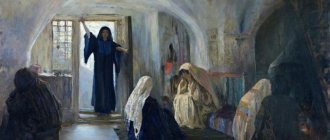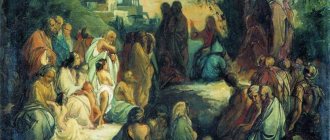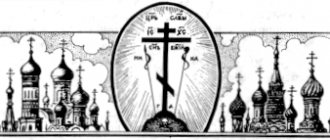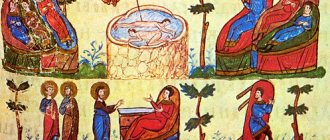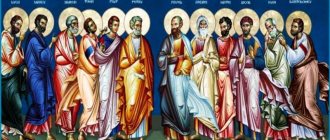Jesus Christ walked throughout Galilee, healing people and preaching to them the Gospel of the Kingdom of God in order to heal not only their body, but also their soul. Rumors about Jesus spread throughout the area, and many people followed him.
Seeing the multitude of people, He went up the mountain and sat down to teach His disciples and the people. Many thought that the main thing was health, and therefore they came to be healed. But Christ taught something completely different.
The Old Testament Ten Commandments are a law that keeps people from sinful acts. And the New Testament is the law of Divine love and grace, showing how one can become a spiritually healthy person and achieve holiness. Here God Himself descended to earth and became incarnate in man. He Himself fulfilled this law and gave grace-filled power to His followers to fulfill it. (Matt.5:17)
“I am the way and the truth and the life; no one comes to the Father except through Me” (John 14:6). This is what Christ says, who paved the way for us to the Heavenly Kingdom. And all Christians must follow this Path, taking up their cross.
The emergence of the commandments
In Old Testament times, the Lord gave people 10 commandments carved on stone tablets. Wanting to give people the opportunity to overcome original sin, the Lord ordered and forbade them to commit acts that carried evil and darkness. Following the Old Testament commandments reveals the Lord to man, cleansing the soul from sinful filth. But to achieve the grace of the Kingdom of Heaven, it is not enough to simply be cleansed of evil. It is necessary to fill the vacated space with virtues that contribute to the improvement of the human spirit.
The Beatitudes are recorded in chapter 5 of the Gospel of Matthew.
It is about the basic moral rules by which a true Christian must live that the nine Beatitudes speak. Jesus Christ spoke about them during the Sermon on the Mount, which was used by his disciples and people who came to hear His Word. The new commandments complemented the prohibitive instructions given by God to Moses, showing people the way to the Kingdom of Heaven.
Tears of repentance and other forms of crying
If we turn to the history of the Old Testament, we will see how many prophets cried about their imperfections. For example, King David, who in the psalms often sighs about his sins: “I am weary with my groanings: every night I wash my bed, I wet my bed with my tears” (Ps. 6:7). And the New Testament recalls the lament of the Apostle Peter: “Then the Lord turned and looked at Peter, and Peter remembered the word of the Lord, how He said to him: Before the rooster crows, you will deny Me three times. And he went out and wept bitterly” (Luke 22:61-62). The Lord Himself also wept - over Lazarus, whom He loved, and in the Garden of Gethsemane, where He shed bloody tears.
Crying is an expression of a person's spiritual state. It can be different. St. Ephraim the Syrian distinguishes three different forms of crying. The first is crying about what is connected with our ordinary earthly life, about visible objects. The second one is the one that we need so much - these are tears of repentance. The third is the cry of sinners, about which the Holy Scripture speaks: “the sons of the kingdom will be cast out into outer darkness: there will be weeping and gnashing of teeth” (Matthew 8:12). So the second type of crying - tears of repentance - according to the saint, are “sweet and useful.” They are extremely necessary for spiritual life, because they are blessed sorrow for our sins. A person did something wrong and understands that this left an imprint on his relationship with the Creator, depriving him of light, joy, and peace. If sorrow about this is connected with God, then, according to the Apostle Paul, it will lead to salvation: “For Godly sorrow produces unfailing repentance leading to salvation, but worldly sorrow produces death” (2 Cor. 7:10).
How to achieve bliss
The Beatitudes, which form the main part of the Sermon on the Mount. These words of the savior contain both the components of the road to happiness and the reward that awaits the person who follows this path.
Nine Beatitudes
- Blessed are the poor in spirit, for theirs is the Kingdom of Heaven.
- Blessed are those who mourn, for they will be comforted.
- Blessed are the meek, for they will inherit the earth.
- Blessed are those who hunger and thirst for righteousness, for they will be satisfied.
- Blessed are the merciful, for they will receive mercy.
- Blessed are the pure in heart, for they will see God.
- Blessed are the peacemakers, for they will be called sons of God.
- Blessed are those who are persecuted for the sake of righteousness, for theirs is the Kingdom of Heaven.
- Blessed are you when they revile you and persecute you and slander you in every way unjustly because of Me. Rejoice and be glad, for great is your reward in heaven.
What is bliss for a Christian?
Most modern people understand the word bliss to mean very vivid emotions that deliver physical pleasure. There is also a negative interpretation of this word, since people whose actions and words do not fit into the norms of generally accepted logic are called blessed.
But Christ’s commandments speak of bliss, which implies the acquisition of spiritual happiness, which consists in gaining unity with the Lord. To find happiness and joy in eternal heavenly life, on earth a person must be poor, thirsty, weeping and humbly enduring persecution and suffering.
More about the Commandments:
- Commandment to love your enemies
- Ten Commandments of God in Orthodoxy
- Commandment "Thou shalt not steal"
Interpretation of the commandments
For modern man, it is especially difficult to follow the Beatitudes, since their true interpretation contradicts the social values that have developed in society. But understanding the deep meaning of Christ’s commandments will help fill the soul with virtues and overcome worldly temptations.
Interesting: some theologians compare the Beatitudes to a pyramid, overcoming each step of which brings a person closer to the Kingdom of Heaven.
Spiritual poverty
The first beatitude says that people who are poor in spirit will find happiness. This does not mean that the Kingdom of Heaven is open only to the poor, since the Lord did not speak about material goods. To understand the Savior’s words, it is necessary to remember that the poor humbly accept everything that those around them give them. They do not expect the giver to ask for something in return. The beggar understands that he lives on the alms of people, without being able to do anything for them.
Jesus Christ revealed the Beatitudes in the Sermon on the Mount
Theologians say that spiritual poverty is not a lack of talent, goals and spirituality, but the humility with which a person accepts the Will of the Lord. Even a rich and talented person must understand: everything he has is not his merit, but a gift from the Creator. A person must use what the Lord has sent down to him to gain eternal life next to Him. A humble person accepts everything he has with sincere gratitude and joy, does not judge others, trying to help them in word and deed.
Spiritual Crying
The second commandment says that people who are able to cry will find comfort and happiness next to the Lord. In this saying we are talking about real tears, visible to others, and about internal heartfelt crying. The clergy note that tears in the gospel understanding can be of the following nature:
- Tears of repentance appear in a person who sees his sins and repents of them. At the same time, there is a connection between tearful repentance and the awareness of oneself as a spiritually poor person who understands his insignificance before the Lord. Tears during confession express the sadness of a soul that has lost Paradise and the Grace of God. They cleanse her from sinful filth, helping her to hear His Voice, which comforts and gives peace. In this they differ from the loud, often ostentatious tears of a person, caused by the fear of realizing one’s sins and the fear of punishment for committing them.
- A person is capable of tears of compassion if there is room in his heart for compassion and the ability to feel the grief and sadness of those around him. A compassionate person approaches the Lord, who shares joy and sorrow with all his children.
Repentance and compassion, expressed in tears, strengthen the human spirit. They cleanse the soul from sin and fill the heart with love.
Silent Patience
The Lord said that a person’s happiness lies in meekness. Meekness is a combination of humility and patience. A meek person silently endures insults and insults inflicted on him, forgiving and compassionate to his offenders. But he must stand up for the oppressed and defenseless people around him, showing compassion, courage and fortitude.
In Scripture, meekness is often contrasted with arrogance and pride. A meek person is a strong-willed person who is aware of his weakness before God’s Providence. He understands that everything that happens to a person happens according to His will and it is necessary to accept it with humility and patience.
The Beatitudes show man the path to spiritual exaltation
The interpretation of the second part of the commandment, which states that a meek person will receive land as a reward, is ambiguous. Some believe that the reward for humble people will be the land of the Kingdom of God. But most theologians believe that people who face trials with humility and patience are protected by the Lord in earthly life. They will receive land both in worldly life, as they will gradually replace sinners on Earth, and in the Kingdom of Heaven, as a reward for virtues.
Desire to find the truth
The fourth beatitude says that happy people will be those who daily seek the truth. This thirst for truth cannot be replaced by physical needs and immediate worldly desires. Truth in the gospel understanding is righteousness, life in accordance with the word of God. Unity with the Lord is the meaning of every person’s life, to which he must strive throughout his earthly life, realizing his dependence on Him. In order to find grace in the Kingdom of the Lord, people must carry this in their souls, thoughts and deeds every minute.
Mercy and Forgiveness
The fifth beatitude is considered by many to be the easiest to fulfill. Mercy is the ability to be merciful, kind and tolerant of the shortcomings of others. This is exactly how the Lord treats his children, giving them an example of how to treat others. Moreover, His mercy is manifested not only in kindness and tolerance, and in the ability to forgive. For people, the ability to forgive an offender and respond to evil with good is a difficult test. To develop the virtue of mercy, people must perform various acts of mercy. Theologians divide them into material and spiritual.
Material mercy consists of the following actions:
- Provide food and drink to people in need who are unable to obtain it on their own.
- Give clothes or funds to purchase them to a person who needs them.
- Visiting prisoners, sick and infirm people.
- We welcome travelers into our home with cordiality.
- Providing a decent burial for a person who dies in poverty.
A person who knows the truth about God's love becomes merciful to everyone
Spiritual mercy towards others is as follows:
- With wise words, prevent the commission of a sinful act and lead the sinner away from the wrong path.
- Show the ignorant people around you the true path to finding the Lord.
- Help others overcome difficulties and avoid danger by giving good advice and wise guidance.
- Pray to the Lord for the people around you, since prayer is the help that any Christian can provide to any suffering person, even a stranger.
- Help a person overcome sadness, since it is a spiritual illness that prevents him from letting the Lord into his life.
- Forgive evil deeds and verbal insults.
Merciful deeds should not be displayed or performed with the hope of retribution. Such actions are not pleasing to the Lord and lead a person to the wrong path.
Interesting about Orthodoxy:
- Spiritual crisis
- Canon law
- Spiritual food
Purity of heart
In the sixth commandment, Christ says that people with a pure heart can see Him. Christianity believes that it is from the heart that all human feelings and emotions come. God must live in the heart of a Christian, and therefore love for the world around him. All thoughts and deeds of a person come from the heart, which determine his behavior.
A person in whose heart there is no place for sinful filth and evil thoughts is able to know God and realize his dependence on His Will. But at the same time, without a heart free from sins, a person cannot realize his insignificance and repent for unrighteous deeds.
Happiness is in keeping the peace
For the Lord, all humanity is children. He, like all parents, rejoices when children live in peace, harmony and love. God notes people who strive to reconcile warring people, without holding evil and filth in their own hearts. The greatest spiritual feat in Christianity is considered to be reconciliation with oneself. Having found peace in your own soul, you can draw closer to the Lord and be able to help those who suffer.
The commandment to have peace with people is placed very highly in the Gospel
Exile for truth
The eighth beatitude again mentions “truth,” which is the Lord and man’s desire for union with Him. But the path to the Creator is difficult, as it is filled with obstacles, temptations and trials. A true Christian always differs from most people around him, since he puts spiritual life above material life. He remembers that the earthly path is the beginning of eternal life in the Kingdom of Heaven for the righteous who live according to the Word of God.
The essence of the Sermon on the Mount of Jesus Christ, its summary
Evangelist Matthew concentrated in the Sermon on the Mount the main essence of Christ's teaching about salvation (Matthew 5, 6, 7). The Sermon on the Mount of Jesus Christ consists of the Beatitudes and their further interpretation. The Lord showed here what spiritual dispositions we must have in order to draw closer and closer to God and acquire bliss, that is, the highest form of happiness.
Christianity calls people to happiness. From a Christian point of view, happiness is the acquisition of spiritual properties similar to God. Happiness is the Kingdom of God within us. This means that the meaning of Christian life is to become like God, to acquire the Holy Spirit.
Chapter 5
After the Beatitudes, the Lord says: “You are the salt of the earth.” Salt is the spirit of Christ, which keeps the world from moral corruption and decay. The disciples must transmit this spirit to the whole earth. (Matt.5:13).
"You are the light of the world." The disciples of Christ must set an example of Christian morality to the whole world, so that the name of God is not blasphemed among the pagans. That is, people who call themselves Christians must live according to the gospel commandments. (Matthew 5:14)
Christ shows that the Old Testament is outdated, and He gives us the New. We must not imitate the Pharisees, who fulfilled only the external rules of the law and for show, but did not have the spirit of God (Matt. 5:17-20). Next, the Lord teaches us how to surpass the “righteousness” of the scribes and Pharisees in order to enter the Kingdom of Heaven, and lists the virtues:
- Jesus supplements the commandment “thou shalt not kill” with the prohibition to be angry in vain and to speak evil. You cannot offend or offend anyone, but you must make peace with your opponent and forgive.
- Jesus complements the commandment “thou shalt not commit adultery” with the virtue of chastity: one must protect oneself from temptations, dirty thoughts and desires (Matt. 5:21-32).
- You cannot break an oath, but it is better not to swear at all.
- You cannot avenge yourself, leave vengeance to God, but you must overcome evil with good. We must love our enemies in order to become like God, who loves all people. “Be ye therefore perfect, even as your Father in heaven is perfect” (Matthew 5:33-48).
Chapter 6
- You must give alms, pray and fast in secret, “and Your Father, who sees in secret, will reward you openly.”
Here Christ commands us to fight vanity not only in front of people, but also in our thoughts: “let not your left hand know what your right hand is doing” (Matt. 6:1-18).
- The Lord gives us the Lord's Prayer.
If we want the Lord to forgive our sins, then we ourselves should not bear grudges, but forgive the sins of our debtors. We ask God that in temptations He will help us defeat the evil one, that is, not sin (Matt. 6:9-13).
- “Do not lay up for yourselves treasures on earth,” but lay up them in heaven, “for where your treasure is, there will your heart be also.”
Having overcome vanity, the Lord speaks of non-covetousness, because people acquire a lot of wealth because of vanity.
- “You cannot serve God and mammon.”
Christ does not forbid us to work, but forbids us to put concern for material wealth in the first place, neglecting God. Heavenly Father knows what we need. Therefore, “seek first the kingdom of God and His righteousness, and all these things will be added to you.” (Matt.6:19-34)
Chapter 7
- "Judge not lest ye be judged".
If we mourn our sins, we will not notice the sins of others, and the Lord will not condemn us. If we condemn, then Christ compares our sin to a log, and the sin of the one we judge compares to a branch. Therefore, only a sinless, holy person can expose someone. (Matt.7:1-5)
- "Ask, and it shall be given you; seek and you will find; knock, and it will be opened to you.”
Having given us great and difficult commandments, Christ shows us how we can fulfill them: through continuous prayer. Without the grace of God, it is impossible to fulfill the commandments.
“Therefore in everything that you would have people do to you, do so to them, for this is the law and the prophets.” (Matt.7:7-12)
Christ likens every Christian who listens to the Gospel commandments and fulfills them to a prudent builder who built the house of his soul on a rock (the rock is Christ), and no temptations will destroy him. But a person who only believes, but does not live according to the gospel, will be like a reckless builder who built the house of his soul on the sand, but when tempted he falls. (Matt.7:21-27)
